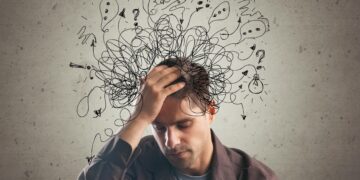Finding Real Solutions for Real Struggles, When the Mind Feels Too Heavy
It’s not just a bad day. It’s not just “overthinking.”
When your heart races for no reason or when getting out of bed feels like lifting a mountain, you know it runs deeper. Depression and anxiety aren’t phases.
They are real, exhausting, and often invisible battles people fight every single day.
So the question becomes urgent: What is the best treatment for depression and anxiety?
The truth is, no single approach fits everyone. But with the right care, compassion, and clinically proven strategies, it is possible to feel better. This guide breaks down treatment options, why they work, and how HU Centers can help you take your first meaningful step toward healing.
Understanding Depression and Anxiety: Two Sides of the Same Storm
Depression and anxiety often coexist. You may feel numb and drained one minute, then overwhelmed and panicked the next. Though they can present differently, both affect how you think, feel, and function.
Symptoms of Depression:
- Persistent sadness or hopelessness
- Sleep disturbances
- Loss of interest or pleasure
- Fatigue and lack of motivation
Symptoms of Anxiety:
- Restlessness or nervous energy
- Rapid heartbeat, tension, or sweating
- Constant worry or fear
- Difficulty concentrating
If you’re asking, what is the best treatment for depression and anxiety, you’re likely feeling both. The good news? Integrated treatment addresses both conditions at once, because they often feed off one another.
Therapy, The Foundation of Long-Term Healing
Cognitive Behavioral Therapy (CBT)
CBT is considered one of the most effective first-line approaches for treating both disorders. It helps rewire negative thought patterns that fuel depression and anxiety.
At HU Centers, CBT is personalized and often combined with other therapies. You’ll learn to:
- Identify and challenge irrational beliefs
- Build healthier coping skills.
- Replace spiraling thoughts with grounded responses
Dialectical Behavior Therapy (DBT)
If emotions feel too intense to manage, DBT might be the answer. This approach teaches distress tolerance, emotional regulation, and mindfulness.
Exposure Therapy (for Anxiety)
When fears feel paralyzing, exposure therapy, done gradually and safely, can retrain the brain to respond differently to triggers.
Bottom line: What is the best treatment for depression and anxiety? Therapy is often the first, and most effective, place to start.
Medication, Correcting Chemical Imbalances
While therapy works on thoughts and behaviors, medications work on the brain’s biology. Depression and anxiety are both linked to neurotransmitter imbalances, particularly serotonin, dopamine, and norepinephrine.
Common Medications Include:
- SSRIs (Selective Serotonin Reuptake Inhibitors) like Prozac and Zoloft
- SNRIs (Serotonin-Norepinephrine Reuptake Inhibitors) like Cymbalta
- Benzodiazepines for short-term anxiety relief
- Atypical antidepressants like Wellbutrin
At HU Centers, medication management is always supervised by licensed psychiatric professionals who tailor dosages to individual needs.
Tip: Medication isn’t a “crutch”, it’s often the first step toward regaining balance when things feel out of control.
Holistic and Integrative Care
What is the best treatment for depression and anxiety without relying solely on pills? Many people find relief through holistic support systems that enhance traditional treatment.
Mindfulness and Meditation
Meditation can reduce stress hormones and calm racing thoughts. Our mindfulness-based programs teach grounding techniques and body awareness to help manage panic and depressive episodes.
Nutritional Support
Research shows gut health impacts mood. Nutritional counseling at HU Centers focuses on anti-inflammatory, brain-healthy diets to stabilize energy and improve emotional regulation.
Exercise Therapy
Regular physical activity boosts mood-lifting chemicals like endorphins and serotonin. Even low-impact routines like walking or yoga can dramatically reduce anxiety symptoms.
Intensive Outpatient and Residential Programs
For those needing more than weekly therapy but not full hospitalization, HU Centers offers structured outpatient and residential care.
These programs provide:
- Daily therapeutic support
- Group therapy and peer connection
- 24/7 emotional assistance
- Medical and psychiatric oversight
You’ll work with therapists, case managers, and mental health specialists who know that what is the best treatment for depression and anxiety depends on consistent, compassionate support.
The Role of Support Systems
Recovery doesn’t happen in isolation.
At HU Centers, we offer:
- Family therapy to rebuild communication and trust
- Alumni networks to maintain accountability and support after discharge
- Psychoeducation workshops to help loved ones understand your journey
Having the right people around you can make all the difference in long-term stability.
New Frontiers in Mental Health Treatment
Innovation is changing how we approach mental health care. If you’ve tried everything and still ask, “What is the best treatment for depression and anxiety?” you’re not alone, and there are emerging options.
Ketamine-Assisted Therapy
Used in treatment-resistant cases, ketamine can rapidly reduce depressive symptoms when administered safely in clinical settings.
TMS (Transcranial Magnetic Stimulation)
A non-invasive procedure that stimulates underactive areas of the brain, often used when medication hasn’t worked.
EMDR (Eye Movement Desensitization and Reprocessing)
Originally for trauma, EMDR is now being used to treat depression and anxiety rooted in unresolved past events.
HU Centers keeps pace with mental health innovations while staying grounded in evidence-based care.
Powerful Facts That Build Trust
- The Anxiety and Depression Association of America reports that anxiety disorders affect 40 million adults every year, but only about 36.9% receive treatment.
- Studies show that CBT has a success rate of 60–70% for treating anxiety and depression long-term.
- Antidepressants show a 50–60% improvement rate when taken consistently with clinical support.
- According to Harvard Health, exercise is just as effective as antidepressants for mild to moderate depression.
Let HU Centers Be the Beginning of Your Breakthrough
The answer to what is the best treatment for depression and anxiety isn’t one-size-fits-all. It’s a combination of science, support, and a plan that’s built around you.
At HU Centers, we believe mental health care should feel human, not clinical. Our mission is to walk beside you through the fog of anxiety, through the weight of depression, and into the clarity of recovery.
You don’t have to carry this alone.
Call HU Centers today or reach out through our confidential form to find a personalized treatment program that matches your needs. The first step might be hard, but it’s also the one that changes everything.
Frequently Asked Questions
Q. What is the best treatment for depression and anxiety?
A. The best treatment for depression and anxiety usually includes a combination of therapy (like CBT), medication, lifestyle changes, and strong support systems. HU Centers offers customized care to help you find what works best for you.
Q. Can I recover from depression and anxiety without medication?
A. Yes, many people benefit from therapy, mindfulness, exercise, and other non-medication strategies. However, for some, medication provides the needed balance to fully engage in healing. At HU Centers, we help you decide what’s right for your journey.
Q. How long does treatment for depression and anxiety take?
A. It varies. Some people see progress in weeks, while others need ongoing care. With consistent support and the right plan, healing is absolutely possible.
Q. What types of therapy are best for treating both conditions together?
A. Cognitive Behavioral Therapy (CBT), Dialectical Behavior Therapy (DBT), and mindfulness-based approaches are highly effective for treating both depression and anxiety simultaneously.
Q. Why choose HU Centers for mental health treatment?
A. HU Centers provides evidence-based, compassionate care with personalized treatment plans. Our dedicated team ensures you’re never alone in your journey toward emotional wellness.









